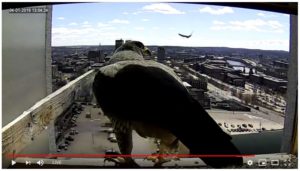by Dyanna Smith
Coming in for work this morning, I hear the news: there are three eggs in the falcon box! Peregrine Falcons are breeding in downtown Manchester for the 19th consecutive year. The live stream camera is on in the McLane Center lobby and sounds float up into my office. Raptor Biologist Chris Martin is with me discussing what we want to report about all of this in today’s email. We open up the website on my computer and watch as we talk.

“The amazing thing about the Manchester site, is that you are in the nest,” Chris says, talking about the fact that this is the one site where three cameras pick up all the action and stream it online. “While there is a lot of attention devoted to this single pair of falcons, similar breeding activity is happening at nearly 25 other sites around the state.”
Just as he finishes his thought, the female jumps up off the eggs and starts calling loudly. “Listen – something has her going!” We peer into the computer. Chris starts narrating, “there may be another falcon out there that doesn’t belong.” I can see what looks like two other falcons moving quickly in the distance, “I see them! He’s going after another bird!” I say back to Chris, getting louder myself.
“That could be another falcon coming in to their territory – a migrant or juvenile looking for a place to nest or a bird from an adjacent territory,” he explains as the female jumps out onto the perch, still hollering. She takes off in the commotion and then the male appears and moves into the box in her place.
“She’s just gone off to defend the nest,” Chris tells me, “and he saw her leave so he’s back to cover for her and incubate while she is out.”
That’s just a few minutes of the action going on right now. The next egg is predicted early Wednesday morning (a dedicated watchers group estimates that 58 hours pass between each egg, and the last egg was laid yesterday at 8:05pm). Use this link to find all three camera angles, and scroll down below the camera 1 stream image to see the times for all eggs and other interesting details about the Manchester pair.
Support NH Audubon’s Peregrine Research
